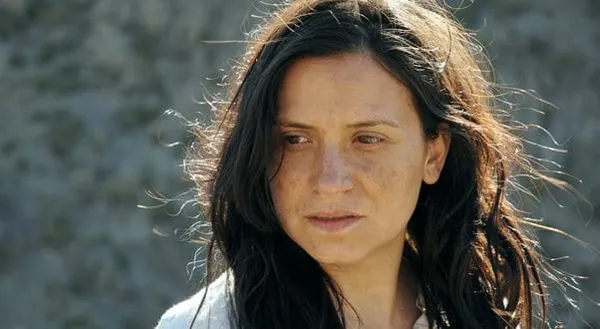Eye For Film >> Movies >> Violeta Went To Heaven (2011) Film Review
Violeta Went To Heaven
Reviewed by: Jennie Kermode

The wind is buffeting the desert scrub. A woman lies in a ditch, her skin and clothes stained by the dust. Her child runs up to her. At first, she is still. The child grows alarmed. Then she opens her eyes, laughing.
A biopic of the Chilean folk singer, composer, ethnomusicologist and painter Violeta Parra, this is a film that mirrors her work in its approach, focused more on theme and ideas than on simple narrative and more effectively capturing her character as a result. Francisca Gavilán is riveting in the lead, impressively evoking Violeta's vocal style during musical performance as well as dialogue. She anchors a woman who, though she often explored deeply personal subjects in her work, was difficult to get to know. through this, the film makes the argument that self-understanding for Violeta was equally difficult, in that she had such an abundance of self - of passion and ideas - that she could never find a truly satisfactory way to express it.

There's a sense that this struggle relates to Violeta's decision to act as a vector of cultural transmission for her people, to carry the weight of the ancestors and their concerns. We begin in that desert, among the poor, the rural old folk at first wary of engaging. We see Violeta's persistence break them down like that stubborn wind. As the wind catches her and takes her to Europe, buffets her with personal tragedy and disorientating romance, her creativity seems to be a product of desperation. What will become of her if there is no longer anybody there to receive?
For fans, this film will be a delight. Most will find that they learn something new and take great pleasure in the abundance of songs. Here, the old Chilean songs fulfill their original purpose, as storytelling elements, but now they bear the weight of a new history. Songs about people long dead combine to transmit the story of their rescuer. Violeta's own compositions mingle easily with them and her paintings inspire the visual structure of many scenes, so that when we look at Warsaw or Paris we are doing so through Chilean eyes. The power in this perspective adds an extra charge to scenes in which Violeta confronts class prejudice, her well-earned pride in her accomplishments roaring against others' perceptions of her as a poor, brown skinned woman whom some of the value only as a novelty. Slights are harder to bear because they impact all that she embodies. The weight of the world becomes greater each time she ventures into it.
A considered tribute to a fascinating subject, this is a film for all lovers of art and creativity, for all those who are attracted, rather than repelled, when things become difficult.
Reviewed on: 15 Feb 2014

















